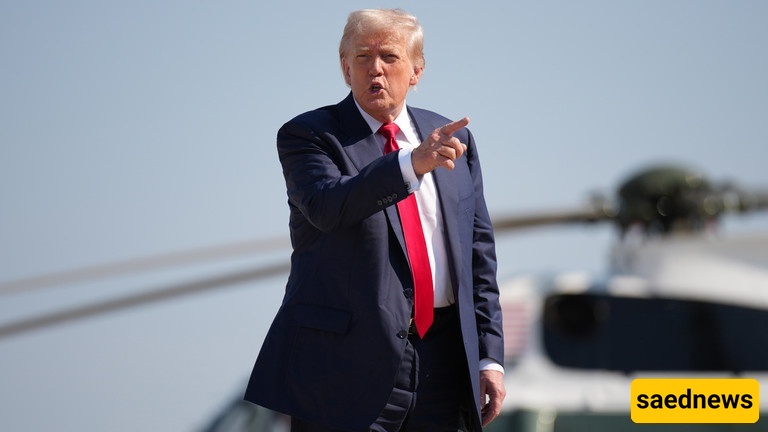SAEDNEWS: Following the release of a new report highlighting weak employment conditions in the United States, former President Donald Trump has dismissed a senior official from the country’s labor statistics agency.

According to Saed News, citing Bloomberg, in a controversial and high-profile move, former U.S. President Donald Trump dismissed a senior official at the U.S. Bureau of Labor Statistics (BLS) shortly after the release of new employment data revealing weaknesses in the labor market. The decision not only sparked widespread reactions across political and media circles but also raised serious questions about the independence of statistical agencies and how politicians confront economic realities.
Reports indicate that the dismissal occurred just hours after the monthly employment report was published, showing job growth far below economists’ expectations and little improvement in the unemployment rate. Trump, who has consistently touted economic performance as one of his key strengths, was reportedly angered by the report and made the decision to remove the official in a closed-door meeting. Although the Trump administration’s official statement cited a "management restructuring" as the reason, sources close to the matter linked the move directly to the former president’s dissatisfaction with a "possible political bias in the data."
But is releasing negative employment figures truly justification for firing a top national statistician? U.S. statistical agencies are legally mandated to operate independently of the government. The Bureau of Labor Statistics is structured to withstand political pressures. However, during his presidency, Trump repeatedly showed skepticism toward this independence. During the COVID-19 pandemic, he questioned reports from federal health agencies and even dismissed some officials for providing "misleading or discouraging information."
Some analysts view Trump’s recent action as an attempt to preserve his personal narrative of the U.S. economy. Throughout his presidency, Trump repeatedly highlighted employment figures as a symbol of his success, and whenever data contradicted his expectations, he dismissed them as “inaccurate,” “distorted,” or even “hostile.” This behavioral pattern continues in the post-presidential period, as Trump actively participates in the 2024 election campaign and sees the portrayal of a weak economy under Biden as a key to his victory.
On the other hand, some of Trump’s former allies have criticized this move. A former White House economic advisor, who wished to remain anonymous, told a television network, “If we only accept data that pleases us and punish data producers for unpleasant numbers, there will be no statistics left that we can trust.” He added, “This action not only weakens the statistical agency but also makes the investment and economic analysis environment more unstable.”
Economists have also expressed concern about the long-term effects of such approaches. Dr. Jennifer Lee, an economics professor at the University of Chicago, said, “Official statistics play a vital role in economic decision-making, from central bank monetary policies to government support programs. If these statistics become politicized or if fear of dismissal leads to self-censorship, the entire framework of economic analysis will collapse.”
In the media landscape, this news was reflected with two distinct approaches. Conservative outlets, including Fox News, framed Trump’s move as a “necessary accountability measure for government agencies” and argued that “employment data must be accurate and reliable, not influenced by particular narratives.” In contrast, more liberal media such as CNN and The New York Times interpreted the decision as a sign of Trump’s strong desire to control the truth, warning that it is a dangerous step toward eroding public trust in government institutions.
From a legal perspective, the dismissal of a federal official—especially in the field of statistics—carries complexities. While the president can remove unelected officials, the institutional independence of agencies like the Bureau of Labor Statistics (BLS) means such decisions should be based on professional standards rather than political motives. It remains unclear whether the dismissed official will contest the decision, but some sources have indicated the possibility of legal action.
As the 2024 election approaches, Trump is striving to revive his image of a “successful America,” a narrative tarnished by the economic fallout of the COVID-19 pandemic, high unemployment rates, and class discontent during his presidency. In this pursuit, apparently, any obstacle—even impartial statistical data—can be removed from the path.
However, this approach may ultimately backfire on Trump himself. The American public, especially following the COVID-19 crisis and economic volatility, pays closer attention to statistics than ever before. If they sense that the data are manipulated or skewed in favor of a political agenda, not only will public trust erode, but Trump’s project to return to the White House will face serious challenges.
Ultimately, firing a statistical official solely for reporting economic realities is neither a sign of strength nor effective management. Rather, it signals a deeper crisis: politicians who seek to rewrite the narrative instead of addressing the economy itself.

